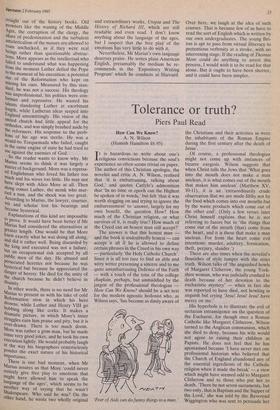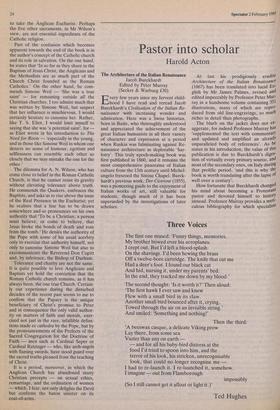Tolerance or truth?
Piers Paul Read
How Can We Know? A. N. Wilson (Hamish Hamilton £6.95) Tt is hazardous to write about one's 'religious convictions because the soul's experience so often seems trivial on paper. The author of this Christian apologia, the novelist and critic A. N. Wilson, realised that 'it is embarrassing, talking about God,' and quotes Carlyle's admonition that 'In no time or epoch can the Highest be spoken of in words,' but felt 'that it was worth slogging on and trying to ignore the embarrassment' to 'answer, largely for my own benefit, the question How? How much of the Christian religion, or what survives of it, is really true? How much of the Creed can an honest man still accept?'
The answer is that this honest man — and the book is undoubtedly honest — can accept it all if he is allowed to define certain phrases in the Creed in his own way — particularly 'the Holy Catholic Church'. Since it is all too rare to find an able and witty writer presenting a sincere and to me quite imembarrassing Defence of the Faith — with .a touch of the tone of the college chaplain, perhaps, but unmuddled by the jargon of the professional theologian — How Can We Know? should be a set text for the modern agnostic hedonist who, as Wilson says, 'has become as dimly aware of 'Fear of Aids can do funny things to a man.' the Christians and their activities as were the inhabitants of the Roman Empire during the first century after the death of Jesus'.
Of course, a professional theologian might not come up with instances of bizarre exegesis. Wilson suggests that when Christ tells the Jews that 'What goes into the mouth does not make a man unclean, it is what comes out of the mouth that makes him unclean' (Matthew XV, 10-11),. it is an 'extraordinarily crude observation that we are made filthy not by the food which comes into our mouths but by the waste products which come out of the other end'. (Only a few verses later Christ himself explains that he is not referring to faeces but to 'the things that come out of the mouth (that) come from the heart, and it is these that make a man unclean. For, from the heart come evil intentions: murder, adultery, fornication, theft, perjury, slander.') There are also times when the novelist's flourishes of style tamper with the strict truth. Wilson talks of 'the anguished howls of Margaret Clitherow, the young York- shire woman, who was judicially crushed to death because of her devotion to the eucharistic mystery' — when in fact she was reported to have died, not howling in anguish but crying `Jesu! Jesu! Jesu! have mercy on me.'
His hyperbole is to illustrate the evil of sectarian intransigence on the question of the Eucharist, for though once a Roman Catholic like Margaret Clitherow, Wilson turned to the Anglican communion, which she died to deny, because his wife would not agree to raising their children as Papists. He does not feel that he has apostasised because 'I have never met one professional historian who believed that the Church of England abandoned any of the essential ingredients of the Catholic religion when it made the break' — a view which might have seemed odd to Margaret Clitherow and to those who put her to death. 'There be not seven sacraments, but two only, that is Baptism and the Supper of the Lord,' she was told by the Reverend Wiggington who was sent to persuade her to take the Anglican Eucharist. Perhaps the five other sacraments, in Mr Wilson's view, are not essential ingredients of the Catholic religion.
Part of the confusion which becomes apparent towards the end of the book is in the author's concept of the Catholic church and its role in salvation. On the one hand, he states that 'In so far as they share in the Baptism of Jesus Christ, the Anglicans and the Methodists are as much part of the Church Christ founded as the Roman Catholics.' On the other hand, he com- mends Simone Weil — 'She was a true saint' — for remaining outside all the Christian churches. I too admire much that was written by Simone Weil, but suspect that her influence is mischievous. I would certainly hesitate to canonise her. Rather, like T. S. Eliot, I would limit myself to saying that she was 'a potential saint', for — as Eliot wrote in his introduction to The Need for Roots — 'especially in the young, and in those like Simone Weil in whom one detects no sense of humour, egotism and selflessness can resemble each other so closely that we may mistake the one for the other.'
The dilemma for A. N. Wilson, who has come close to belief in the Roman Catholic Church, is that he cannot resist its gravity without elevating tolerance above truth. He commends the Quakers, embraces the Baptists, and asks us to rise above the issue of the Real Presence in the Eucharist; yet he realises that a line has to be drawn somewhere and so pronounces on his own authority that 'To be a Christian, a person must believe, or come to believe, that Jesus broke the bonds of death and rose from the tomb.' He denies the authority of the Pope with some of his usual acerbity only to exercise that authority himself, not only to canonise Simone Weil but also to excommunicate the Reverend Don Cupitt and, by inference, the Bishop of Durham.
Tolerance and charity are not the same. It is quite possible to love Anglicans and Baptists yet hold the conviction that the Roman Catholic church remains, as it has always been, the one true Church. Certain- ly our experience during the disturbed decades of the recent past seems to me to confirm that the Papacy is the unique beneficiary of Christ's promise to Peter and in consequence the only valid author- ity on matters of faith and morals, exer- cised not just in the rare, infallible defini- tions made ex cathedra by the Pope, but by the pronouncements of the Prefects of the Sacred Congregation for the Doctrine of Faith — men such as Cardinal Seper or Cardinal Ratzinger — who, like arch-angels with flaming swords, have stood guard over the sacred truths gleaned from the teaching of Christ.
It is a period, moreover, in which the Anglican Church has abandoned many Christian precepts — on sexual ethics, remarriage, and the ordination of women — which, I fear, not only delights the Devil but confirms the baton sinister on its coat-of-arms.











































 Previous page
Previous page